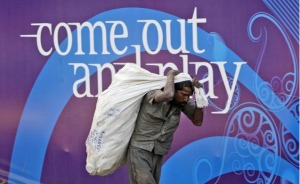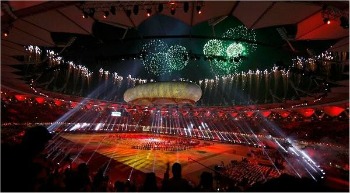No More Fun and Games for Delhi
The 2010 Commonwealth Games in New Delhi highlighted some of India’s best and worst traits and revealed the sad truth that the country may not yet be poised for superpower stature. Due to a number of rough-ups before the Commonwealth Games began on October 3, India must now choose whether to learn from its mistakes or gloss over them over like they never happened. Be that as it may, in order to stay a player in the race against China, Brazil, and South Africa, it is advised that India place its thinking cap swiftly on and be ready to seek guidance if it wants to be a leader in the global arena.
The Commonwealth Games were a chance for India to leap onto the world stage and strikingly demonstrate its power – at least many Indians thought this would be the case. It was seen as the country’s first chance to unleash its soft power on a global stage and soak up the praise after it was all done. Instead the Commonwealth Games exposed India’s corruption, lack of infrastructure, and an inability to take care of its people.
A worker hauls a bag of trash picked in New Delhi, next to a Commonwealth Games slogan.
© The Hindu October 5, 2010
New Delhi‟s infrastructure had undergone much rehabilitation in order to accommodate the high flow of traffic for the Commonwealth Games. However, twoweeks before the Games started, the footbridge connecting to the main stadium (bridge number three) collapsed injuring 23 workers. Press coverage around the world attacked India and its inability to correctly implement its infrastructure and shed light on accusations that illegal permits and corruption had taken place in order to give New Delhi a time-sensitive facelift. The ultimate cost for this facelift is still unknown, but is estimated around $4.6 billion dollars, nowhere near the budget of $500 million dollars approved by the Indian Government in 2003. Additionally, according to the Housing and Land Rights Network, a research group, 100,000 families were evicted from their dwellings in order to grant space to new buildings for the Games.
Amongst a string of unfavorable press, the BBC broadcast photos from the athletes’ village depicting dirty bathrooms and other unhygienic living conditions. Some athletes from Scotland and New Zealand called their accommodations “unfit for human habitation” and were ultimately relocated.
Jawaharlal Nehru stadium during the Commonwealth Games closing ceremony.
© The New York Times October 14, 2010.
Empty seats and high ticket prices also stained the reputation of the Commonwealth Games organizers, and weigh-in troubles for the Boxing matches did not help either. But perhaps the biggest faux pas for India was a slip of the tongue made by the Games’ Organizing Committee Chairman Suresh Kalmadi, calling Prince Charles’ wife Camilla Parker-Bowles, Princess Diana instead. In the mere two week span of the Commonwealth Games, around 300 complaints of corruption were made to India‟s Central Bureau of Investigation.
Given India’s impressive opening and closing galas and its enormous soft power potential, the fallout from the Games is especially disappointing. When people reminisce about the days of the 2010 Commonwealth Games they will likely not remember India’s soft power displays: the vibrant fashion, the Bollywood performers, a terrific sporting match or even the hypnotizing performance of A. R. Rahman. Instead they will remember the headlines and images that branded India as just not up to par.
Tags
Issue Contents
Most Read CPD Blogs
-
January 29
-
January 20
-
December 17
-
January 28
-
January 2
Visit CPD's Online Library
Explore CPD's vast online database featuring the latest books, articles, speeches and information on international organizations dedicated to public diplomacy.











Add comment